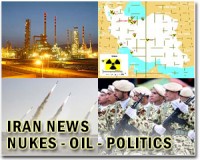 |
Beirut, Lebanon (UPI) May 11, 2010 Iran has deployed 200-300 Shehab-1 and Shehab-2 ballistic missiles that can hit the Gulf Arab states but the short-term threat Tehran's missile arsenal poses to these U.S.-allied countries and to Israel has been overstated. That's the conclusion reached by the International Institute for Strategic Studies in London, a widely respected think tank, in a special report on Iran's missile program released Monday, although Iran has made "robust strides" in developing longer range weapons than it has at present. "Iran's ballistic missiles could be used as a political weapon to wage a terror campaign against adversary cities," particularly in the Middle East, the report said. These would be armed with conventional high-explosive warheads. "While such attacks might trigger fear, the expected casualties would be low -- probably less than a few hundred, even assuming that that Iran unleashed its entire ballistic missile arsenal and that the majority of the missiles penetrated missile defenses." Most media coverage of the report, "Iran's Ballistic Missile Capabilities: A Net Assessment," has focused primarily on the threat of Iran producing intercontinental ballistic missiles that would threaten the United States and Europe. But the more immediate danger from current Iran's missile array is faced by Israel, and to a lesser extent Iran's Arab neighbors in the gulf. The primary target, of course, is clearly Israel, which has threatened to launch pre-emptive strikes against Iran's nuclear program. The Shehab-1 and 2 cannot reach Israel but the emerging solid-fuel Shehab-3B and the Sejjil-2, likely to be operational within three years, can. "The military utility of Iran's ballistic missiles is severely limited because of their very poor accuracy," the report stressed. "The missiles would probably be incapable of shutting down critical military activities. "The confident destruction of a single, fixed-point military target, for example, would require Iran to allocate a very significant percentage, if not all, of its missile inventory to one specific mission. "Against large-area military targets, such as an airfield or seaport, Iran could conduct harassment attacks aimed at disrupting operations or causing damage at fuel storage depots, but the missiles would probably be incapable of shutting down critical military activities." A lack of transport-erector-launchers "and the delays necessary to reload would also be limiting factors to any massive attack," the IISS noted. This assessment is at odds with those disclosed by Israel's military and intelligence establishment and even some American analysts. Some of these have estimated that in the event of a sustained Iranian missile bombardment, backed by barrages from Hezbollah in Lebanon, Hamas in the Gaza Strip, and possibly Syria as well, Israel would suffer extremely heavy casualties. These don't differentiate between Iran's missiles and the short-range missiles and rockets fired by its allies, which being infinitely more numerous -- Israel claims Hezbollah alone has as many as 45,000 projectiles -- would be likely to inflict more casualties than Iran's conventional weapons. The Tehran regime's drive to develop long-range missiles is being conducted "in tandem" with the nuclear project, the report said. "The two programs appear to be connected, with the aim of giving Iran the capability to deliver nuclear warheads well beyond its borders, though Iran steadfastly denies any interest in nuclear weapons and claims that its missiles are strictly defensive in nature." The report's authors, IISS analysts Mark Fitzgerald and Michael Elleman, argue that Iran's current missile arsenal isn't much use for conventional attacks or even biological or chemical warfare. "The possibility of chemical or biological warhead use cannot be excluded, although Iran is not known to possess such weapons and has forsworn them by treaty," the report said. "Even if arms with chemical or biological warheads, however, the missiles could not reliably and predictably deliver enough warfare agent over a wide enough area to stop an adversary's military operations." In that scenario, Israel would presumably be capable of unleashing retaliatory salvos of its own Jericho-2 ballistic missiles against Iranian targets and these are deemed far more accurate than the Iranian weapons. "Moreover," the report went on, "Iran has too few missiles, TELs and trained launch crews to sustain the delivery of chemical agent to the battlefield for more than a few hours." But it added, "Nuclear warheads have a much stronger strategic logic and all of Tehran's ballistic missiles are inherently capable of a nuclear payload, if Iran is able to make a small enough bomb."
Share This Article With Planet Earth
Related Links Learn about nuclear weapons doctrine and defense at SpaceWar.com Learn about missile defense at SpaceWar.com All about missiles at SpaceWar.com Learn about the Superpowers of the 21st Century at SpaceWar.com
 Surprise dinner fails to break Iran nuclear deadlock
Surprise dinner fails to break Iran nuclear deadlockWashington (AFP) May 7, 2010 A surprise, high-profile UN dinner failed to break the deadlock with Iran over its nuclear plans as the United States called it a "missed opportunity" and kept up the pressure Friday for UN sanctions. The Obama administration also claimed that Iran's dinner invitation to all 15 UN Security Council members on Thursday is another sign that Tehran is worried about its international isolation an ... read more |
|
| The content herein, unless otherwise known to be public domain, are Copyright 1995-2010 - SpaceDaily. AFP and UPI Wire Stories are copyright Agence France-Presse and United Press International. ESA Portal Reports are copyright European Space Agency. All NASA sourced material is public domain. Additional copyrights may apply in whole or part to other bona fide parties. Advertising does not imply endorsement,agreement or approval of any opinions, statements or information provided by SpaceDaily on any Web page published or hosted by SpaceDaily. Privacy Statement |